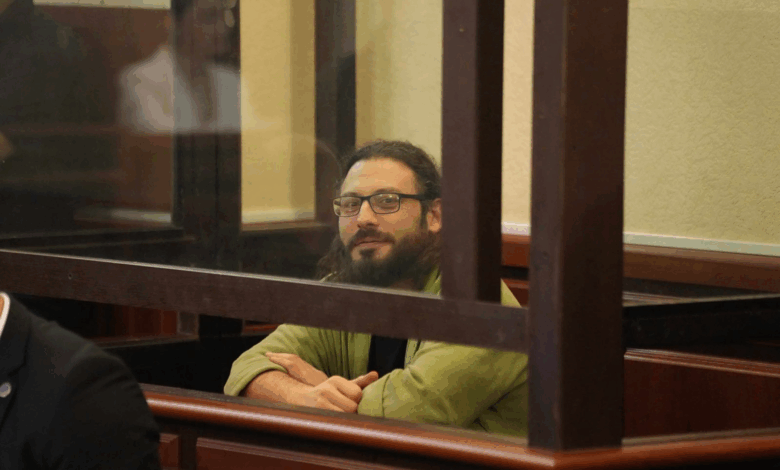
Activist Saba Skhvitaridze Jailed for Two Years over Confronting Masked Police with No Insignia
Saba Skhvitaridze, an activist and member of the opposition Ahali party, was sentenced to two years in prison after a court found him guilty of inflicting “intentional bodily harm” while confronting police at a protest. Skhvitaridze pleaded innocent, with his defense arguing he had acted in self-defense after a police officer without insignia attacked another person in his group.
Tbilisi City Court Judge Jvebe Nachkebia announced the ruling on September 3, in the 24th jail verdict among those detained in the context of protests since November 2024.
“I am not going to kneel to the regime, please be strong,” Saba Skhvitaridze said in his closing remarks, according to RFE/RL’s live blog from the court. He added he believes “the decisions [on verdicts] are not made in this building [court].”
Originally charged under Article 353 Prima of the Georgian Criminal Code, involving assaulting a police officer and causing health damage, a crime punishable by 7 to 11 years in prison, Skhvitaridze’s case was later reclassified under Article 120 as inflicting “intentional minor bodily harm,” an offense carrying a milder penalty of a fine, correctional labor, house arrest, or one to three years in prison.
Skhvitaridze was detained on December 5, a day after the incident near the Courtyard Marriott Hotel in central Tbilisi, close to the epicenter of protests that erupted following the Georgian Dream announcement on halting EU integration. The confrontation broke out after a group that had left the hotel following an opposition meeting was approached by men in black plain clothes wearing medical masks.
According to the defense, which cites video evidence from the scene, the incident occurred when opposition member Teona Chalidze pulled down the hood of one of the men, reportedly believing he was a thug, a so-called Titushka. Violent Titushki attacks were frequently reported during the early weeks of the protests. The man responded by slapping Chalidze in the face, which, according to the defense, prompted Skhvitaridze to intervene. The prosecution later identified the man, who wore no insignia at the time of the incident, as police officer Mirian Kavtaradze and as the alleged victim.
During the hearings, prosecutors argued that the investigation was complete, the video evidence authentic, and that witnesses confirmed Skhvitaridze assaulted Kavtaradze. The defense, however, insisted the investigation was biased, citing the lack of neutral witnesses, failure to obtain hotel surveillance or media footage, and reliance on a 29-second video clip downloaded from social media without verification.
Skhvitaridze’s case was the first among protest-related trials of those detained since last November in which the court agreed to reclassify and downgrade the charges. The defense, however, maintained that he should never have been held in detention, arguing that the activist had acted in lawful self-defense.
Skhvitaridze was also among the detainees who reported inhuman treatment at the hands of police, including beatings and rape threats. On June 24, Amnesty International sent a letter to Georgia’s Prosecutor General, urging a prompt, impartial, and effective investigation into the allegations of torture and ill-treatment of Skhvitaridze and calling for those responsible to be brought to justice in fair trials.
24 persons in total detained in the context of the pro-EU and anti-Georgian Dream protests since last November have faced jail sentences, including Zviad Tsetskhladze, Vepkhia Kasradze, Vasil Kadzelashvili, Giorgi Gorgadze, Irakli Miminoshvili, Insaf Aliev, Tornike Goshadze, Nikoloz Javakhishvili, Anton Chechin, Archil Museliantsi, Davit Khomeriki, Anatoli Gigauri, Temur Zasokhashvili, Davit Lomidze, Mzia Amaghlobeli, Anri Kakabadze, Anri Kvaratskhelia, Saba Jikia, Giorgi Mindadze, Mate Devidze, Denis Kulanin, Daniel Mumladze and Guram Khutashvili.
Seven more remain in prison after being convicted over their involvement in the spring 2024 protests against the foreign agents law, including Omar Okribelashvili, Saba Meparishvili, Pridon Bubuteishvili, Davit Koldari, Giorgi Kuchuashvili, Giorgi Okmelashvili, and Irakli Megvinetukhutsesi. Two more persons—Ucha Abashidze and Mariam Iashvili, were arrested in a similar context but convicted for illegally obtaining and storing secrets of private life.
Eight individuals, including six active opposition politicians, were recently sentenced to prison terms of several months for defying the Georgian Dream investigative commission.
Two persons- Tedo Abramovi and Giorgi Akhobadze – have been acquitted of serious drug charges linked to the protests and activism.
Politpatimrebi.ge, a civic platform documenting the cases of detainees, currently lists over 60 persons who were jailed in 2024-2025 and are considered political prisoners.
The verdicts come as no police officer has been held accountable despite numerous documented abuses during dispersals. Dozens of protesters remain in pre-trial custody, awaiting their rulings on similar or other protest-related charges.
Also Read:
- Repression in Numbers
- 04/02/2025 – Testimonies of Police Brutality During Pro-European Rallies
- 31/01/2025 – TI-Georgia Report Alleges Fabricated Charges and Political Persecution of Activist
This post is also available in: ქართული